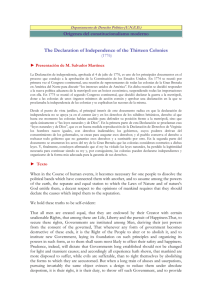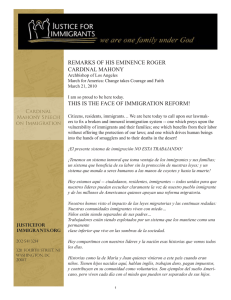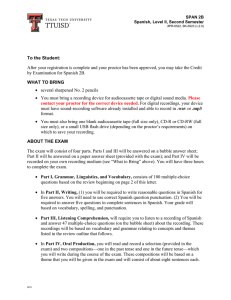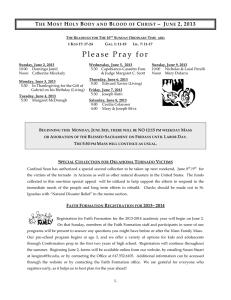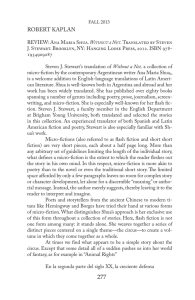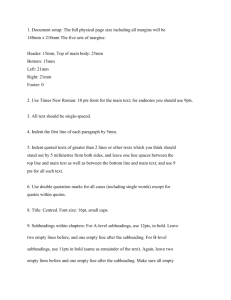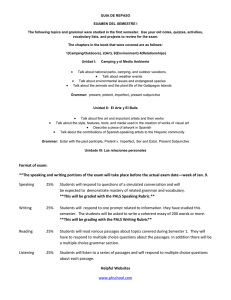one by Gloria Anzaldua
advertisement
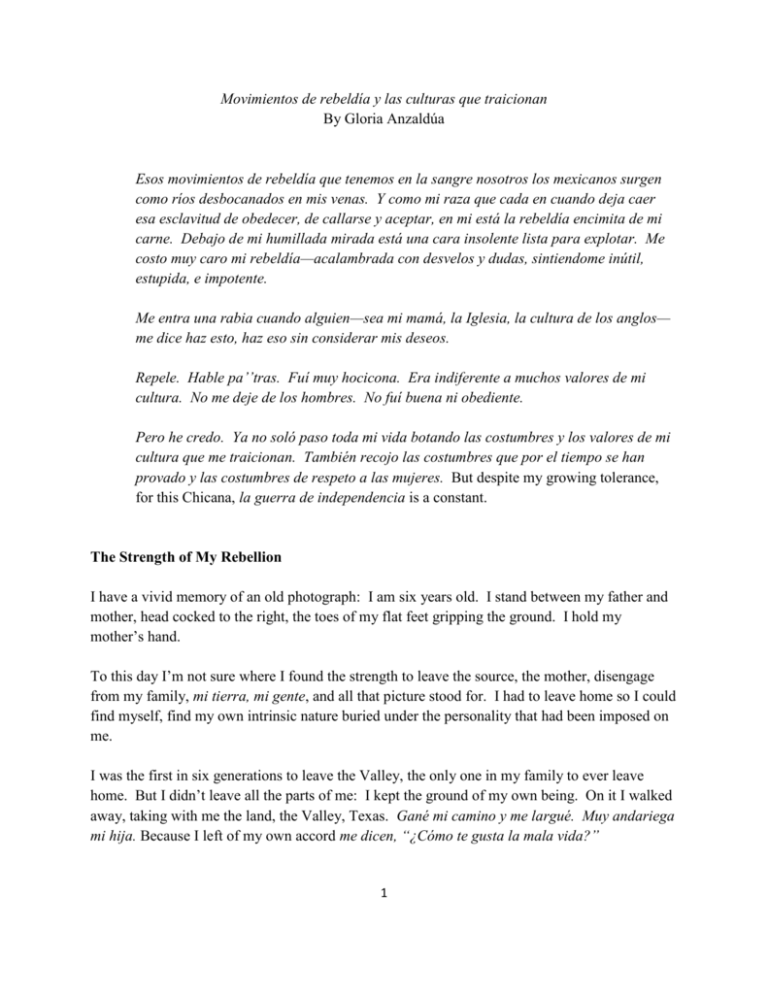
Movimientos de rebeldía y las culturas que traicionan By Gloria Anzaldúa Esos movimientos de rebeldía que tenemos en la sangre nosotros los mexicanos surgen como ríos desbocanados en mis venas. Y como mi raza que cada en cuando deja caer esa esclavitud de obedecer, de callarse y aceptar, en mi está la rebeldía encimita de mi carne. Debajo de mi humillada mirada está una cara insolente lista para explotar. Me costo muy caro mi rebeldía—acalambrada con desvelos y dudas, sintiendome inútil, estupida, e impotente. Me entra una rabia cuando alguien—sea mi mamá, la Iglesia, la cultura de los anglos— me dice haz esto, haz eso sin considerar mis deseos. Repele. Hable pa’’tras. Fuí muy hocicona. Era indiferente a muchos valores de mi cultura. No me deje de los hombres. No fuí buena ni obediente. Pero he credo. Ya no soló paso toda mi vida botando las costumbres y los valores de mi cultura que me traicionan. También recojo las costumbres que por el tiempo se han provado y las costumbres de respeto a las mujeres. But despite my growing tolerance, for this Chicana, la guerra de independencia is a constant. The Strength of My Rebellion I have a vivid memory of an old photograph: I am six years old. I stand between my father and mother, head cocked to the right, the toes of my flat feet gripping the ground. I hold my mother’s hand. To this day I’m not sure where I found the strength to leave the source, the mother, disengage from my family, mi tierra, mi gente, and all that picture stood for. I had to leave home so I could find myself, find my own intrinsic nature buried under the personality that had been imposed on me. I was the first in six generations to leave the Valley, the only one in my family to ever leave home. But I didn’t leave all the parts of me: I kept the ground of my own being. On it I walked away, taking with me the land, the Valley, Texas. Gané mi camino y me largué. Muy andariega mi hija. Because I left of my own accord me dicen, “¿Cómo te gusta la mala vida?” 1 At a very early age I had a strong sense of who I was and what I was about and what was fair. I had a stubborn will. I tried constantly to mobilize my soul under my own regime, to live life on my own terms no matter how unsuitable to others they were. Terca. Even as a child I would not obey. I was “lazy.” Instead of ironing my younger brothers’ shirts or clearning the cupboards, I would pass many hours studying, reading, painting, writing. Every bit of self-faith I’d painstakingly gathered took a beating daily. Nothing in my culture approved of me. Había agarrado malos pasos. Something was “wrong” with me. Estabá más allá de la tradición. There is a rebel in me—the Shadow-Beast. It is a part of me that refuses to take orders from outside authorities. It refuses to take orders from my conscious will, it threatens the sovereignty of my rulership. It is that part of me that hates constraints of any kind, even those self-imposed. At the least hint of limitations on my time or space by others, it kicks out with both feet. Bolts. Cultural Tyranny Culture forms our beliefs. We perceive the version of reality that it communicates. Dominant paradigms, predefined concepts that exist as unquestionable, unchallengeable, are transmitted to us through the culture. Culture is made by those in power—men. Males make the rules and laws; women transmit them. How many times have I heard mothers and mothers-in-law tell their sons to beat their wives for not obeying them, for being hociconas (big mouths), for being callajeras (going to visit and gossip with neighbors), for expecting their husbands to help with the rearing of children and the housework, for wanting to be something other than housewives? The culture expects women to show greater acceptance of, and commitment to, the value system than men. The culture and the Church insist that women are subservient to males. If a woman rebels she is mujer mala. If a woman doesn’t renounce herself in favor of the male, she is selfish. If a woman remains a virgen until she marries, she is a good woman. For a woman of my culture there used to be only three directions she could turn: to the Church as a nun, to the streets as a prostitute, or to the home as a mother. Today some of us have a fourth choice: entering the world by way of education and career and becoming self-autonomous persons. A very few of us. As a working class people our chief activity is to put food in our mouths, a roof over our heads and clothes on our backs. Educating our children is out of reach for most of us. Educated or not, the onus is still on woman to be a wife/mother—only the nun can escape motherhood. Women are made to feel total failures if they don’t marry and have children. “¿Y cuándo te casas, Gloria? Se te va a pasar el tren.” Y yo lés digo, “Pos si me caso, no va ser con un hombre.” Se quedan calladitas. Si, soy hija de la Chingada. I’ve always been her daughter. No ‘tés chingando. Humans fear the supernatural, both the undivine (the animal impulses such as sexuality, the unconscious, the unknown, the alien) and the divine (the superhuman, the god in us). Culture 2 and religion seek to protect us from these two forces. The female, by virtue of creating entitites of flesh and blood in her stomach (she bleeds every month but does not die), by virtue of being in tune with nature’s cycles, is feared. Because, according to Christianity and most other major religions, woman is carnal, animal, and closer to the undivine, she must be protected. Protected from herself. Woman is the stranger, the other. She is man’s recognized nightmarish pieces, his Shadow-Beast. The sight of her sends him into a frenzy of anger and fear. La gorra, el rebozo, la mantilla are symbols of my culture’s “protection” of women. Culture (read males) professes to protect women. Actually it keeps women in rigidly defined roles. It keeps the girlchild from other men—don’t poach on my preserves, only I can touch my child’s body. Our mothers taught us well, “Los hombres nomás quieren una cosa”; men aren’t to be trusted, they are selfish and are like children. Mothers made sure we didn’t walk into a room of brothers or fathers or uncles in nightgowns or shorts. We were never alone with men, not even those of our own family. Through our mothers, the culture gave us mixed messages: No voy a dejar que ningún pelado desgraciado maltrate a mis hijos. And in the next breath it would say, La mujer tiene que hacer lo que le diga el hombre. Which was it to be—strong, or submissive, rebellious or conforming? Tribal rights over those of the individual insured the survival of the tribe and were necessary then, and, as in the case of all indigenous peoples in the world who are still fighting off intentional, premeditated murder (genocide), they are still necessary. Much of what the culture condemns focuses on kinship relationships. The welfare of the family, the community, and the tribe is more important than the welfare of the individual. The individual exists first as kin—as sister, as father, as padrino—and last as self. In my culture, selfishness is condemned, especially in women; humility and selflessness, the absence of selfishness, is considered a virtue. In the past, acting humble with members outside the family ensured that you would make no one envidioso (envious); therefore he or she would not use witchcraft against you. If you get above yourself, you’re an envidiosa. If you don’t behave like everyone else, la gente will say that you think you’re better than others, que te crees grande. With ambition (condemned in the Mexican culture and valued in the Anglo) comes envy. Respeto carries with it a set of rules so that social categories and hierarchies will be kept in order: respect is reserved for la abuela, papá, el patrón, those with power in the community. Women are at the bottom of the ladder one rung above the deviants. The Chicano, mexicano, and some Indian cultures have no tolerance for deviance. Deviance is whatever is condemned by the community. Most societies try to get rid of their deviants. Most cultures have burned and beaten their homosexuals and others who deviate from the sexual common. The queer are the 3 mirror reflecting the heterosexual tribe’s fear: being different, being other, and therefore lesser, therefore sub-human, in-human, non-human. Half and Half There was a muchacha who lived near my house. La gente del pueblo talked about her being una de las otras, “of the Others.” They said that for six months she was a woman who had a vagina that bled once a month, and that for the other six months she was a man, had a penis and she peed standing up. They called her half and half, mita’ y mita’, neither one nor the other but a strange doubling, a deviation of nature that horrified, a work of nature inverted. But there is a magic aspect in abnormality and so-called deformity. Maimed, mad, and sexually different people were believed to possess supernatural powers by primal cultures’ magico-religious thinking. For them, abnormality was the price a person had to pay for her or his inborn extraordinary gift. There is something compelling about being both male and female, about having an entry into both worlds. Contrary to some psychiatric tenets, half and halfs are not sufferings from a confusion of sexual identity, or even from a confusion of gender. What we are suffering from is an absolute despot duality that says we are able to be only one or the other. It claims that human nature is limited and cannot evolve into something better. But I, like other queer people, am two in one body, both male and female. I am the embodiment of the hieros gamos: the coming together of opposite qualities within. Fear of Going Home: Homophobia For the lesbian of color, the ultimate rebellion she can make against her native culture is through her sexual behavior. She goes against two moral prohibitions: sexuality and homosexuality. Being lesbian and raised Catholic, indoctrinated as straight, I made the choice to be queer (for some it is genetically inherent). It’s an interesting path, one that continually slips in and out of the white, the Catholic, the Mexican, the indigenous, the instincts. In and out of my head. It makes for loquería, the crazies. It is a path of knowledge—one of knowing (and of learning) the history of oppression of our raza. It is a way of balancing, of mitigating duality. In a New England college where I taught, the presence of a few lesbians threw the more conservative heterosexual students and faculty into a panic. The two lesbian students and we two lesbian instructors met with them to discuss their fears. One of the students said, “I thought homophobia meant fear of going home after a residency.” And I thought, how apt. Fear of going home. And of not being taken in. We’re afraid of being abandoned by the mother, the culture, la Raza, for being unacceptable, faulty, damaged. Most of 4 us unconsciously believe that if we reveal this unacceptable aspect of the self our mother/culture/race will totally reject us. To avoid rejection, some of us conform to the values of the culture, push the unacceptable parts into the shadows. Which leaves only one fear—that we will be found out and that the Shadow-Beast will break out of its cage. Some of us take another route. We try to make ourselves conscious of the Shadow-Beast, stare at the sexual lust and lust for power and destruction we see on its face, discern among its features the undershadow that the reigning order of heterosexual males project on our Beast. Yet still others of us take it another step: we try to waken the Shadow-Beast inside us. Not many jump at the chance to confront the Shadow-Beast in the mirror without flinching at her lidless serpent eyes, her cold clammy moist hand dragging us underground, fangs barred and hissing. How does one put feathers on this particular serpent? But a few of us have been lucky—on the face of the Shadow-Beast we have seen not lust but tenderness; on its face we have uncovered the lie. Intimate Terrorism: Life in the Borderlands The world is not a safe place to live in. We shiver in separate cells in enclosed cities, shoulders hunched, barely keeping the panic below the surface of the skin, daily drinking shock along with our morning coffee, fearing the torches being set to our buildings, the attacks in the streets. Shutting down. Woman does not feel safe when her own culture, and white culture, are critical of her; when the males of all races hunt her as prey. Alienated from her mother culture, “alien” in the dominant culture, the woman of color does not feel safe within the inner life of her Self. Petrified, she can’t respond, her face caught between los intersticios, the spaces between the different worlds she inhabits. The ability to respond is what is meant by responsibility, yet our cultures take away our ability to act—shackle us in the name of protection. Blocked, immobilized, we can’t move forward, can’t move backwards. That writhing serpent movement, the very movement of life, swifter than lightning, frozen. We do not engage fully. We do not make full use of our faculties. We abnegate. And there in front of us is the crossroads and choice: to feel a victim where someone else is in control and therefore responsible and to blame (being a victim and transferring the blame on culture, mother, father, ex-lover, friend, absolves me of responsibility), or to feel strong, and, for the most part, in control. My Chicana identity is grounded in the Indian woman’s history of resistance. The Aztec female rites of mourning were rites of defiance protesting the cultural changes which disrupted the equlity and balance between female and male, and protesting their demotion to a lesser status, their denigration. Like la Llorona, the Indian woman’s only means of protest was wailing. 5 So mamá, la Raza¸ how wonderful, no tener que render cuentas a nadie. I feel perfectly free to rebel and to rail against my culture. I fear no betrayal on my part because, unlike Chicanas and other women of color who grew up white or who have only recently returned to their native cultural roots, I was totally immersed in mine. It wasn’t until I went to high school that I “saw” whites. Until I worked on my master’s degree I had not gotten within an arm’s distance of them. I was totally immersed en lo mexicano, a rural, peasant, isolated, mexicanismo. To separate from my culture (as from my family) I had to feel competent enough on the outside and secure enough inside to live life on my own. Yet in leaving home I did not lose touch with my origins because lo mexicano is in my system. I am a turtle, wherever I go I carry “home” on my back. Not me sold out my people but they me. So yes, though “home” permeates every sinew and cartilage in my body, I too am afraid of going home. Though I’ll defend my race and culture when they are attacked by non-mexicanos, consoco el malestar de mi cultura. I abhor some of my culture’s ways, how it cripples its women, como burras, our strengths used against us, lowly burras bearing humility with dignity. The ability to serve, claim the males, is our highest virtue. I abhor how my culture makes macho caricatures of its men. No, I do not buy all the myths of the tribe into which I was born. I can understand why the more tinged with Anglo blood, the more adamantly my colored and colorless sisters glorify their colored culture’s values—to offset the extreme devaluation of it by the white culture. It’s a legitimate reaction. But I will not glorify those aspects of my culture which have injured me and which have injured me in the name of protecting me. So, don’t give me your tenets and your laws. Don’t give me your lukewarm gods. What I want is an accounting with all three cultures—white, Mexican, Indian. I want the freedom to carve and chisel my own face, to staunch the bleeding with ashes, to fashion my own gods out of my entrails. And if going home is denied me then I will have to stand and claim my space, making a new culture—una cultura mestiza—with my own lumber, my own bricks and mortar and my own feminist architecture. The Wounding of the india-Mestiza Estas carnes indias que despreciamos nosotros los mexicanos asi como despreciamos y condenamos a nuestra madre, Malinali. Nos condenamos a nosotros mismos. Esta raza vencida, enemigo cuerpo. Not me sold out my people but they me. Malinali Tenepat, or Malintzin, has become known as la Chingada—the fucked one. She has become the bad word that passes a dozen times a day from the lips of Chicanos. Whore, prostitute, the woman who sold out her people to the Spaniards are epithets Chicanos spit out with contempt. 6 The worst kind of betrayal lies in making us believe that the Indian woman in us is the betrayer. We, indias y mestizas, police the Indian in us, brutalize and condemn her. Male culture has done a good job on us. Son los constumbres que traicionan. La india en mí es la sombra: La Chingada, Tlazolteotl, Coatlicue. Son ellas que oyemos lamentando a sus hijas perdidas. Not me sold out my people but they me. Because of the color of my skin they betrayed me. The dark-skinned woman has been silenced, gagged, caged, bound into servitude with marriage, bludgeoned for 300 years, sterilized and castrated in the twentieth century. For 300 years she has been a slave, a force of cheap labor, colonized by the Spaniard, the Anglo, by her own people (and in Mesoamerica her lot under the Indian patriarchs was not free of wounding). For 300 years she was invisible, she was not heard. Many times she wished to speak, to act, to protest, to challenge. The odds were heavily against her. She hid her feelings; she hid her truths; she concealed her fire; but she kept stoking the inner flame. She remained faceless and voiceless, but a light shone through her veil of silence. And though she was unable to spread her limbs and though for her right now the sun has sunk under the earth and there is no moon, she continues to tend the flame. The spirit of the fire spurs her to fight for her own skin and a piece of ground to stand on, a ground from which to view the world—a perspective, a homeground where she can plumb the rich ancestral roots into her own ample mestiza heart. She waits till the waters are not so turbulent and the mountains not so slippery with sleet. Battered and bruised she waits, her bruises throwing her back upon herself and they rhythmic pulse of the feminine. Coatlalopeuh waits with her. Aquí en la soledad prsopera su rebeldía. En la soledad Ella prospera. 7

